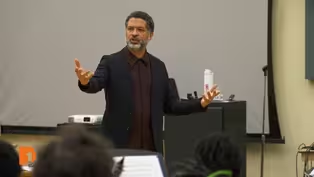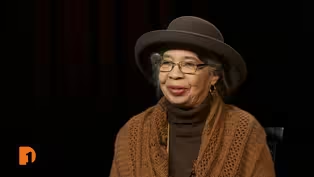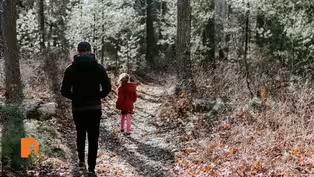
Arab American National Museum’s David Serio details the history of Arab immigration in Michigan
Clip: Season 9 Episode 43 | 7m 2sVideo has Closed Captions
One Detroit’s Sarah Zientarski explores the history of Arab immigration in Michigan.
Southeast Michigan has long been a destination for those seeking opportunity and Arab American communities have been part of that journey going back to the 1800s. One Detroit contributor Sarah Zientarski talks with Arab American National Museum Curator of Education David Serio about his family’s migration story Arab immigration in Michigan, and the Arab American community in the region.
Problems playing video? | Closed Captioning Feedback
Problems playing video? | Closed Captioning Feedback
One Detroit is a local public television program presented by Detroit PBS

Arab American National Museum’s David Serio details the history of Arab immigration in Michigan
Clip: Season 9 Episode 43 | 7m 2sVideo has Closed Captions
Southeast Michigan has long been a destination for those seeking opportunity and Arab American communities have been part of that journey going back to the 1800s. One Detroit contributor Sarah Zientarski talks with Arab American National Museum Curator of Education David Serio about his family’s migration story Arab immigration in Michigan, and the Arab American community in the region.
Problems playing video? | Closed Captioning Feedback
How to Watch One Detroit
One Detroit is available to stream on pbs.org and the free PBS App, available on iPhone, Apple TV, Android TV, Android smartphones, Amazon Fire TV, Amazon Fire Tablet, Roku, Samsung Smart TV, and Vizio.
Providing Support for PBS.org
Learn Moreabout PBS online sponsorship(gentle piano music) At the Arab American National Museum, we focus on different time periods of Arab immigration to the US, dating back to the 1880s.
And the reason a lot of folks initially came to the metro Detroit area was really because of jobs.
Money and economics really drives everything.
A lot of the early immigrants that came to the US were mostly Lebanese and Syrian, mostly Christians, and mostly men, although not exclusively.
You do have some folks coming from like Egypt, and Yemen, and Morocco, and many other places.
One of the big reasons is a lot of missionaries from the US were going over to this part of the world, and they were interacting with these Christians, and they were saying, "Hey, fellow Christians, why don't you guys come to the US," where, you know, really selling the American dream of money growing on trees.
And that was kinda that direct connection, which is why you see larger Christian populations, because they were kind of enticed or sold on that.
The reason that a lot of folks immigrated, specifically to Dearborn, was the automotive industry.
Like, following wherever Ford would open up a factory.
And so, you have folks that would settle in Highland Park.
And then, when he would open up another factory in River Rouge or in Dearborn, the community would kind of pick up and go there.
And so, really, it's just kinda the same story of the automotive factory opening up in Dearborn and people staying.
Ford actually sent people to recruit the Arab, and Arab American community, to work in the auto industry.
Henry Ford actually sent people to some of these countries, like Yemen, Lebanon.
And these workers from Ford would knock on these doors and say, "Hey guys, why don't you come to America?"
There's, you know, again, here are these selling points.
"We can get you a great paying job.
You can make a lot of money."
These Arab immigrants kind of dove in, and became a part of American society, and contributed massively to, again, the economic force in this region, setting up restaurants and shops.
What's interesting, too, is if you look at like the history of Dearborn, in the '50s, '60s, '70s, kind of around that time, the city was not as economically robust as it is today.
And then, Arab folks started coming in and buying up some of the shops, and opening up more restaurants, and more stores, and clothing stores.
And that really revitalized Dearborn to what it is today.
The neighborhood here, I think, was very comforting for a lot of Arab immigrants.
You know, you go where you know people, right?
And this is again, a story that a lot of other communities can relate to, definitely.
But you go where you know people, you go where you have family, right?
So, if I have the choice to go somewhere, I'm gonna go where I already have a community that's set up, where I know family members, friends.
Or even if I don't know anybody, I can still feel the comfort of home by shopping at all the Arabic stores, going to Arabic restaurants, suites, religious institutions, and even people that just speak Arabic can be very, very comforting.
So, that's why Dearborn has continued to grow as this like vibrant Arab American community.
I love when people reference Dearborn as like the spot to go.
For me, it creates a lot of pride.
There's all these stereotypes that exist, but so, when people are coming to our city, coming to the Arab American National Museum, engaging with the restaurant scene, the coffee scene has exploded in the best possible way, it makes me feel really proud that like our community is able to offer something that's connected to our culture and heritage, but then also share those gifts with the rest of our community.
So, our family came from Lebanon to Michigan in the 1910s.
We came in the first time period of immigration, and we came directly to Michigan.
And one of the reasons we came here is because we had family already in the area.
My great-grandfather came over and settled right in Michigan.
He was actually looking for his mother, who had left like years ahead of time.
And eventually, they were able to be reunited.
But yeah, they came right to Michigan, and like fully immersed themselves into the community.
My family never ended up coming to Dearborn.
My family ended up going to, in Detroit, kind of on the east side of Detroit.
And then, eventually kind of made their way north into like Macomb County.
And we found a bunch of other Lebanese Christians that were kind of in the Detroit area.
We kind of like meshed with them, I guess.
And so, we stayed more on the east side of Detroit.
My great-grandpa, initially, came to Michigan.
He found work as a gardener.
And back home in Lebanon, our family were kind of gardeners, farmers.
And so, that was something that he knew.
And even though he wasn't like fluent in English, it was a very easy thing, 'cause he knew that from back home.
There were also some other Lebanese family members of mine who had their own like little markets out of their own home.
And so, like even generation to generation, this idea of like entrepreneurship, and being within the community and providing services, is very much a part of our family story.
My dad was a teacher for a little while.
And then, also ended up being, you know, working for like, just different companies, and kind of like a traveling salesman, if you will.
And then, my mom ended up working for like, in the legal field.
My grandpa really kept up the tradition of, you know, being proud of his Arab American roots, just simply by like, anytime we would have get-togethers as a family, we would have a lot of Arabic food.
There's a dish in Lebanese cuisine, called kibbeh nayeh.
It's like a raw lamb dish.
And my grandfather would always, he would teach some of my male cousins how to make the kibbeh, 'cause it takes a lot of strength, and work, and all that.
And so, I remember him like passing that recipe down to like all of my cousins.
When certain things happened, like 9-11, for example, when certain things happened, I received a lot of stereotypes.
And I didn't understand where they came from.
And I didn't understand why people were saying certain things.
My grandpa was like, "Let me tell you more about our history.
And let me tell you more about who we are, as, you know, Arab Americans."
And he kind of undid a lot of the stereotypes that people were trying to stick on me, and, instead, replaced it with pride.
And so, that's really how I found my path into education, and just finding myself at the Arab American National Museum, because I think it's so, so important to educate the public, dispel stereotypes, and, for a lot of Arab American kids, instill pride in them.
The museum also has a lot of really rich oral history collections.
- [Sarah] Hi, my name is Sarah Abuharaz, and I'm currently a student at Hofstra University.
And I'm going to be telling you the story of my parents' immigration to the United States.
- My favorite oral histories that we've collected is something as part of our digital scrapbook piece.
So, it's an oral history, but it's overlaid with photos.
So, the idea is that people would scan their photos, and then, that family member would kind of narrate what they're seeing and their journey here.
My family did it, actually.
My aunt did it.
She took a bunch of photos, and was telling the story about how our family came to Dearborn, and all that.
(piano music) - [Antoinette] My grandfather, William R. George, immigrated to the USA in 1914 from Baalbek, Becca Valley in Lebanon.
The story goes, as he told it, he got his first job when knocking on the mayor of Detroit's office door, demanding a job in his broken English.
The mayor gave him a job sweeping the streets of Detroit with a broom.
Of course, in those days, there weren't any cars; it was a lot of horses.
So, there was plenty of work.
- Even though my experience is very different from somebody whose family immigrated five years ago, there's still that similarity, there's still that commonality.
And to be a part of that really beautiful tapestry is, it's just a big honor, it's really cool.
(piano music concludes)
Video has Closed Captions
Clip: S9 Ep43 | 7m 36s | One Detroit contributor John Penney talks to Detroit Jazz Festival artist-in-residence Jason Moran. (7m 36s)
Detroit native Dr. Melba Joyce Boyd named Michigan’s thirdpoet laureate
Video has Closed Captions
Clip: S9 Ep43 | 5m 45s | Dr. Melba Joyce Boyd discusses being named the new Michigan Poet Laureate. (5m 45s)
One Detroit Weekend | Things to do around Detroit this weekend: April 25, 2025
Video has Closed Captions
Clip: S9 Ep43 | 1m 43s | One Detroit contributor Haley Taylor of 90.9 WRCJ shares some events coming up this weekend. (1m 43s)
Providing Support for PBS.org
Learn Moreabout PBS online sponsorshipSupport for PBS provided by:
One Detroit is a local public television program presented by Detroit PBS














